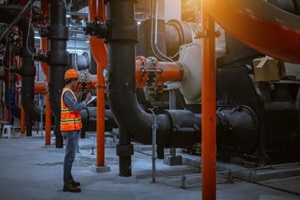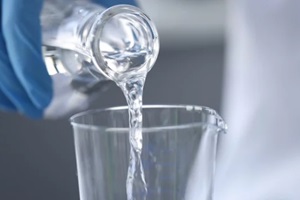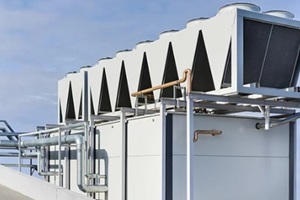 As a facility manager in New York responsible for overseeing chiller systems, you recognize that these units constitute a significant capital investment and play a crucial role in your building’s operation. What’s equally important is the role that water quality plays in maximizing these systems’ longevity and efficiency.
As a facility manager in New York responsible for overseeing chiller systems, you recognize that these units constitute a significant capital investment and play a crucial role in your building’s operation. What’s equally important is the role that water quality plays in maximizing these systems’ longevity and efficiency.
For those responsible for chiller maintenance, neglecting water quality isn’t just an oversight – it’s a costly risk that can degrade performance and lead to unexpected repairs or even premature replacement. Common issues like scale buildup, corrosion, and biological fouling accelerate when water treatment is inadequate.
This guide explores why comprehensive water treatment and routine maintenance are essential for keeping your chillers operating at peak levels. We’ll cover practical tips and strategies to improve efficiency, minimize downtime, and reduce overall costs.
Water Quality’s Direct Impact on Chiller Performance
Water quality has a direct, tangible influence on the health and performance of chiller systems. The water circulating through your chillers can carry contaminants like minerals, debris, and biological agents that deposit on internal surfaces over time. This leads to issues like mineral scale buildup, corrosion, and biofouling.
Scale accumulation is particularly detrimental because it acts as an insulating layer, inhibiting efficient heat transfer. This forces chillers to work harder to achieve the desired cooling effect, resulting in higher energy usage. The excess strain can potentially lead to more frequent breakdowns and reduced operational uptime.
Key Water Parameters for NY Chillers
Maintaining smooth chiller operations starts with mastering water treatment fundamentals tailored to New York’s unique water conditions. It’s crucial to keep chiller water within the ideal pH range, typically between 7-8.5 for systems using New York municipal water supplies.
When pH swings too far in either direction, it becomes highly acidic or alkaline and causes accelerated corrosion on internal metal components. Regular monitoring and adjustments keep pH balanced. Conductivity indicates the overall concentration of dissolved solids in the water.
High conductivity correlates with excessive impurities that promote scale and corrosion. Since New York water sources can have moderate to high dissolved mineral content, closely controlling conductivity is vital for preventing damaging buildup that reduces chiller efficiency.
Biological microorganisms present in water sources can form biofilms that clog internal components and foul heat transfer surfaces in chillers. Keep in mind that cooling towers are also air scrubbers and realize the impact of pollution on what gets brought into your building’s water through the tower.
Regularly adding biocides calibrated for New York’s water conditions helps eliminate this threat and maintain system cleanliness. Implementing a comprehensive water treatment program addressing pH, conductivity, biological control, and other factors creates an optimal environment for chillers using New York water supplies to operate efficiently.
Routine Inspections and Maintenance
 In addition to chemical treatment, physical inspections and maintenance procedures are critical for preserving water quality and chiller performance. This includes visually inspecting for leaks, abnormal noises, compressor operation, and coil cleanliness.
In addition to chemical treatment, physical inspections and maintenance procedures are critical for preserving water quality and chiller performance. This includes visually inspecting for leaks, abnormal noises, compressor operation, and coil cleanliness.
It’s also necessary to assess water flow rates, as inadequate flow exacerbates fouling. Annual tube cleaning should be performed to remove built-up scale and debris. Testing and adjustment of chemical levels is another key maintenance task. Coupling water treatment with routine maintenance will help maximize chiller longevity and efficiency.
Benefits of Automation for NY Facilities
Incorporating automation systems can significantly optimize chiller operations for facilities across New York. Solutions like smart controllers and remote monitoring enable continuous tracking of water quality parameters and system performance data. This allows for automated adjustments to maintain ideal treatment conditions.
Automation also provides predictive capabilities for preemptive maintenance and failure prevention. For facility managers overseeing chillers across multiple locations, it offers centralized monitoring of all units. For facilities subject to New York City’s stringent regulations like Local Law 77 and Local Law 97, automation provides a valuable tool for ensuring full compliance while optimizing energy costs.
Navigating New York’s Unique Challenges
New York facilities face several unique challenges when managing chiller operations. Specifically, New York has several laws in place to manage how water systems are operated, and also has unique incoming water conditions.
As an example, Local Law 77 mandates strict registration, inspection, cleaning, and disinfection protocols for all cooling towers in NYC to prevent Legionnaires’ disease outbreaks. Building owners must develop and adhere to a comprehensive maintenance program, maintain records, and report positive Legionella test results. Compliance requires a proactive, rigorous approach to water treatment beyond standard practices
Separately, Local Law 97 aims to reduce greenhouse gas emissions from large buildings, setting increasingly stringent carbon limits starting in 2024. Facility managers must focus on energy efficiency, particularly in chillers. Optimizing chiller performance through comprehensive water treatment extends equipment life and contributes to meeting efficiency targets.
 New York City’s water is also unique in its softness and corrosivity compared to other regions of the state. Soft water, characterized by low levels of dissolved minerals like calcium and magnesium, is more prone to dissolving metal pipes and components.
New York City’s water is also unique in its softness and corrosivity compared to other regions of the state. Soft water, characterized by low levels of dissolved minerals like calcium and magnesium, is more prone to dissolving metal pipes and components.
This corrosivity can lead to accelerated deterioration of chiller systems, increasing the risk of leaks, equipment failure, and efficiency losses. In contrast, water in upstate New York tends to be harder, with higher mineral content that can cause scaling issues. These regional variations underscore the importance of partnering with a local water treatment professional who understands the specific challenges posed by New York City’s water chemistry.
The Water Treatment Partner for NY Facilities
Achieving optimal chiller performance and maximizing system life hinges on maintaining proper water quality and treatment. By closely controlling factors like pH, conductivity, biological fouling, and scale formation, you’re ensuring efficient operations that reduce energy usage, repair costs, and premature equipment failure.
If you need assistance enhancing your chiller maintenance approach or guidance on tailored water treatment programs, Tower Water is your trusted local partner serving facilities across New York. Our experts understand the state’s unique water conditions and regulatory landscape. Contact us today to learn how our innovative solutions can optimize your chiller operations while ensuring total compliance.
